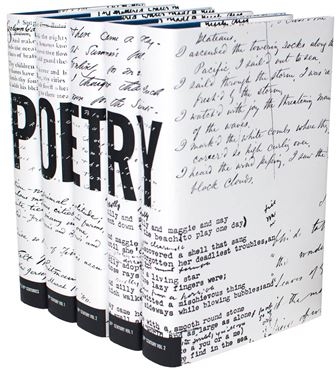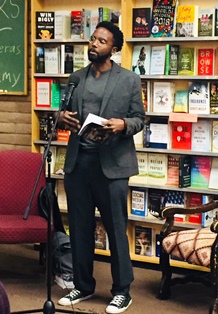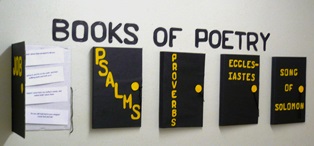
By Brian Nixon, Special to ASSIST News Service
 ALBUQUERQUE, NEW MEXICO (ANS — February 8, 2018) — On my way to a poetry reading to listen to poets Hakim Bellamy and Carlos Contreras read from their newest work, I thought to myself, “Why has poetry had such a long-lasting influence in history?” The answer to the question can be fairly complex, with tomes written—from Aristotle on — giving insight and explanation.
ALBUQUERQUE, NEW MEXICO (ANS — February 8, 2018) — On my way to a poetry reading to listen to poets Hakim Bellamy and Carlos Contreras read from their newest work, I thought to myself, “Why has poetry had such a long-lasting influence in history?” The answer to the question can be fairly complex, with tomes written—from Aristotle on — giving insight and explanation.
For me the answer is simple: God is the epitome Poet and Creator, the Necessary Being for language and imagination. From Him precedes all truth, beauty, and goodness (three of the philosophical transcendentals)—of which poetry, topically, addresses. Furthermore, poetry is an important means in God’s sphere of communication: the Lord used poetry to correspond with humanity.
Think about it: 1/3 of the Old Testament and portions of the New Testament is written in poetry. Whole books such as the Psalms and Song of Solomon were written in verse, not to mention poetical nuances found in the teachings of Jesus and various prophets throughout Holy Writ.
Even the opening verse in the Bible is poetry. Genesis 1: 1 reads, “In the beginning God created the heavens and earth.” Here is poetry and reality mixed into one, a mutual exchange of the truth being communicated in an artful way, joining the true with the beautiful, culminating with something good—creation.
Furthermore, poets in the Bible were valued. Case example, King David. David’s poetry is found in the Psalms and highlighted in his relationship with others, such as his lament over his friend Jonathan (2 Samuel 1). David worshiped, wondered, and wept with poetry.
With David as evidence, I believe poetry is a Biblical and a Christian endeavor. As evidence, poets abound in the Christian faith. Just a cursory jog of my memory came up with several noted Christian poets: John Donne, George Herbert, Gerard Manley Hopkins, Daniel Berrigan, T.S Eliot, Thomas Merton, Brother Antonius (William Everson), C. S Lewis, William Stafford, R. S Thomas, Geoffrey Hill, Czeslaw Milosz, Wendell Berry, and Christian Wiman. And these are just a few. Christian history is ripe with poets [1].
Why are there so many fine poets within the Christian faith?
One reason can be attributed to inspiration, being moved by new life found in Christ and the beautiful vision of the Christian worldview. Poetry is a marvelous means to express emotions.
A second reason could be the emphasis on the word. Christians look to the word, the Bible, for edification, moral guidance, and truth. Words have always played an important role within the Judeo-Christian worldview. Christians are, after all, “people of the Book.” And with an emphasis on the word as inspiration, it is natural to use words to express and emote.
Another thought: the Christian-informed western world has elevated the role of the poet to sage, seer, truth-teller, and beauty-seeker. And Christians yearning to be seekers of beauty and truth have gravitated towards poetry, following a linguistic and logical path led by poetry in order to comprehend and commune with Christ.
Whatever the reason, we can rejoice that so many Christians — and non-Christians alike—have taken to poetry, inspiring us, challenging us, and moving us with words of beauty truth, and goodness.
For those of you who have yet to tackle poetry, I suggest Thomas Aquinas framework for approaching beauty. For Thomas Aquinas the appreciation of beauty had four properties: being/actuality, proportion, clarity, and integrity [2].
Being/Actuality. This is simple: ensure you are reading a poem and not prose. To help, read the words aloud to find a thread of context. If you’re not sure what you are reading, ask for help.
Proportion — balance and symmetry. What is the form of the poem? Is it broken into sections (stanza) or a large paragraph? Is it a haiku (a structured short poem) or something else? Understanding its symmetry, balance, and proportion helps you read the poem with understanding.
Clarity — this is what makes the work standout, the unique factors that emanate from the object. Does the poem rhyme? Is it lucid and intelligible? Does it use specific meter (such as seven syllables per line)? Pay attention to the words and rhythmic value of the lines. How does the poem radiate?
Integrity — this is the wholeness of the object. Is the work integral and complete? What is the poem stating? What are its themes and setting? What are the things (people, animals, etc.) discussed? Does it have a strong beginning, middle, and end?
 Of course these are just one means to appreciate poetry. There are others [3]. But more than understand poetry, my hope is that you’ll read it, letting the words refresh your mind and soul, pointing you to the Creator as the Absolute of all things true, beautiful, and good.
Of course these are just one means to appreciate poetry. There are others [3]. But more than understand poetry, my hope is that you’ll read it, letting the words refresh your mind and soul, pointing you to the Creator as the Absolute of all things true, beautiful, and good.
1. For a short catalog of modern poets, you can skim http://www3.dbu.edu/mitchell/christia3.ht
2. For more on this, read Umberto Eco’s The Aesthetics of Thomas Aquinas
3. If these aren’t helpful, watch poet, Edward Hirch’s video on the subject: https://video.search.yahoo.com/yhs/search?fr=yhs-adk-adk_sbnt&hsimp=yhs-adk_sbnt&hspart=adk&p=how+to+read+a+poem#id=1&vid=67dbab1aab689daf9ee8bc25445c0653&action=click
Photo captions: 1) Poet, Hakim Bellamy. 2) Poet, Carlos Contreras. 3) Book of Poetry in the Bible. 4) Brian Nixon.
About the writer: Brian Nixon is a writer, artist, musician, and educator. He’s a graduate of California State University, Stanislaus (BA), Veritas Seminary (MA), and is a Fellow at Oxford Graduate School (D.Phil.). To learn more, click here: http://en.wikipedia.org/wiki/Brian_Nixon
** You may republish this and any of our ANS stories with attribution to the ASSIST News Service (www.assistnews.net). Please also tell your friends and colleagues that they too can have a free subscription to our news service by signing up there.






